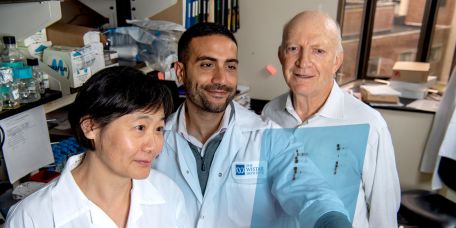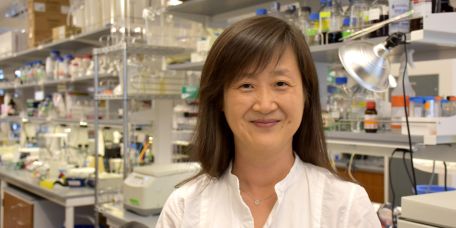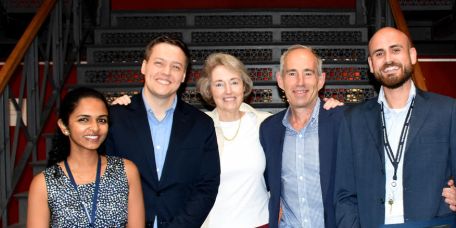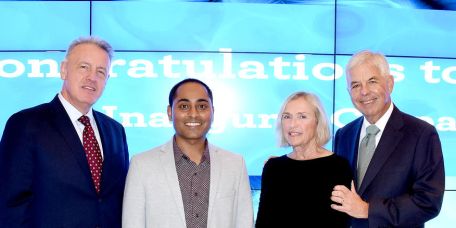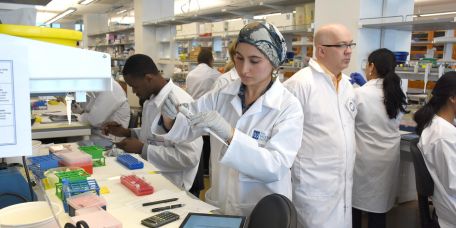The Wistar Institute
Wistar Institute Researcher Awarded American Cancer Society Research Professorship
PRINCETON, N.J. — PHILADELPHIA — (Oct. 22, 2019) — The American Cancer Society (ACS), the largest non-government, not-for-profit funding source of cancer research in the United States, has awarded a Research Professorship to Dmitry l. Gabrilovich, M…
$12.5 Million Grant Awarded to Wistar Extends Federal Support of the Institute’s Quest for Improved Targeted Therapies for Melanoma
PHILADELPHIA — (Oct. 17, 2019) — The Wistar Institute and collaborating institutions have received a major grant from the National Institutes of Health to further research on new melanoma targeted therapies integrating the role of the tumor microenv…
New Mechanism Fueling Brain Metastasis Discovered at Wistar
PHILADELPHIA — (Oct. 9, 2019) — Scientists at The Wistar Institute described a novel mechanism through which astrocytes, the most abundant supporting cells in the brain, also promote cancer cell growth and metastasis in the brain. According to a stu…
2019 Rugart Family Awards Honors Two Outstanding Wistar Trainees
Wistar trainees voted Dr. Emilio Sanseviero, postdoctoral fellow in the Gabrilovich lab, and Keerthana Gnanapradeepan, graduate student in the Murphy lab, winners of the 2019 Annual Rugart Family Awards for best Research-in-Progress (RIP) presentati…
Wistar Celebrates Its Newest Faculty Member & First Caspar Wistar Fellow
A community of supporters—including Wistar scientific leadership and Leadership Council members—came out to meet and welcome Wistar’s first Caspar Wistar Fellow: Dr. Rahul Shinde. Dr. Dario Altieri, Wistar president & CEO, spoke to how the Fello…
Targeting a Novel Regulator of Mitochondrial Cell Death Delivers Anticancer Activity in Preclinical Studies
PHILADELPHIA — (Oct. 3, 2019) — A novel anticancer molecule created by researchers at The Wistar Institute showed therapeutic activity in preclinical models of various cancer types. This cell-permeable peptidomimetic was designed to disrupt a newly…
NIH New Innovator Award Given to Wistar Researcher to Unravel the Metabolic Link Between Diet, Alcohol Consumption and Cancer
PHILADELPHIA — (October 1, 2019) — The National Institutes of Health (NIH) today announced that Zachary T. Schug, Ph.D., assistant professor in the Molecular & Cellular Oncogenesis Program at The Wistar Institute, was awarded the prestigious NIH…
Integral Molecular Announced as First Industry Partner in The Wistar Institute’s Biomedical Research Technician Apprenticeship
PHILADELPHIA – September 25, 2019 – The Wistar Institute, a global leader in cancer, immunology and infectious disease research, has selected Integral Molecular, Inc. as the first industry partner for its Biomedical Research Technician (BRT) Apprent…
Wistar Receives More than $12 Million to Fund Innovative Clinical Research on the Impact of Opioid Use on Response to Therapy in People Living with HIV
PHILADELPHIA — (September 24, 2019) — The Wistar Institute was awarded two major grants totaling more than $12 million from the National Institute on Drug Abuse (NIDA), part of the National Institutes of Health, to fund an international multidiscipl…
Identification of a Novel Regulator of Mitochondrial Cell Death Reveals a Promising Target for Cancer Therapy
PHILADELPHIA — (Sept. 18, 2019) — Researchers at The Wistar Institute have described the role of mitochondrial fission factor (MFF) in controlling survival of cancer cells, suggesting the protein could represent a promising therapeutic target. They…

